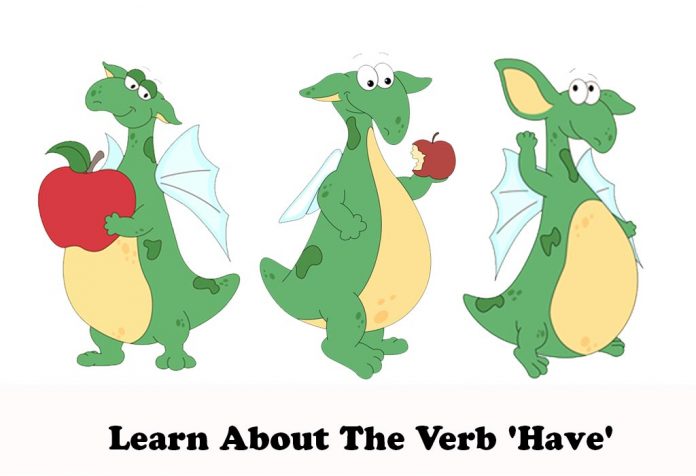In English, ‘To Have’ is one of the most commonly used verb. Children use various forms of this modal verb even without realising it. When you learn about this verb in English grammar, you will note that ‘Have’ is an irregular verb. This means, the form of the word changes when you change the tense of the sentence or the number and person of the subject. Eg. In the present tense, the verb is written as ‘have’. However, in the past tense, we can not simple add ‘ed’ to it, like ‘Haved’. In the past tense, the verb changes to ‘had’. Similarly, for a singular person, you have to say “He has a bicycle.” But when you make it plural, it becomes “They have a bicycle.”
The verb ‘Have’ can also be used as a primary verb in several ways, as well as an auxiliary verb. Let us understand this in more detail here.
Thank you for reading this post, don't forget to subscribe!
Some Uses Of The Verb ‘To Have’
Broadly, we can say that the verb ‘Have’ has three uses. One use of Have is as a primary verb to signify being in possession of something (eg. I have twenty books), being in a certain condition (eg. I have fever today), or even a synonym of eating (eg. I have dinner at 8 pm). The second use of the verb have, is as a modifier, or an auxiliary verb (eg. I have eaten a lot today). The third use of ‘have’ is as a modal verb, used to express a compulsion or obligation (eg. You have to stand up during the National Anthem). Let us understand this in detail, here.
A primary verb is the main verb. It has a meaning by itself and is the acting verb of the sentence. When used as an auxiliary, the verb ‘have’ doesn’t have a specific meaning assigned to it. But it’s still very important, as it helps complete the meaning of the primary verb in sentences that take a more complex tense.
There is also a third use for the verb ‘have’, where it is used as a modal verb. In this case, it’s used to express necessity or obligation.
Base Form Of The Verb ‘To Have’
The “to have” verb is an irregular verb, which means that it changes its spelling depending on the three main forms it takes: present, past, and past participle, as well as the first, second and third person.
The base form is the primary one. Its main use is to make imperative sentences, and also to make the infinitive by adding “to” in front of it. The base form of the verb, thus, is ‘have’.
Present Form Of ‘To Have’
The present form of “to have” is mainly used to form the simple present of a sentence. Since this verb is irregular, there are two ways of writing it in the present: “have” or “has”, and deciding to use one or the other depends on the subject of the sentence, using the subject-verb agreement concept.
Subject Verb
- I Have
- We Have
- You Have
- He Has
- She
- It
- They
Past Form Of ‘To Have’
The past of the “to have” verb is very simple since it’s the same word for all the subjects, whether singular or plural, ie. “had”.
- I
- We
- You
- He
- She
- It
- They
Auxiliary Verb- ‘To Have’
One of the most known uses of this verb ‘have’ is as an auxiliary. The auxiliary helps build the perfect tenses along with other verbs, and it can be used in its present or past form. Also, it’s very important to know that when used as an auxiliary in informal speech and writing, it can be expressed using contractions, by adding ‘ve to the given subject. Eg I’ve visited this place before.
Questions Using The Verb ‘To Have’
When using the verb “to have” as the main verb, the questions should be made using the auxiliary verb “to do”. Here are some examples.
1. How many books do you have?
Answer: I have twenty books.
2. Did you have dinner?
Answer: Yes, I had dinner.
3. Where did she have her birthday party?
Answer: She had her birthday party in the society lawns.
When using the When using the verb “have” as an auxiliary verb, the questions starts with the word ‘Have’ ‘Has’ or ‘had’, followed by the subject, ie the person about whom the question is, followed by the main verb. Here are some examples:
1. Have you studied for the test?
Answer: No, I haven’t studied for the test yet.
2. Has she learnt Bharatnatyam?
Answer: Yes, she has learnt Bharatnatyam for three years.
3. Had you gone to school in your uniform?
Answer: Yes, I had gone to school in my uniform.
When using ‘have’ as a modal verb, the questions can be framed as follows, beginning with the Do/Did/Does auxiliary verb:
1. Did you have to go to church today?
Answer: Yes, I had to go to church today.
2. Do you have to participate in the class activity?
Answer: I don’t have to participate, but I enjoy it.
3. Does she have to go for a party today?
Answer: Yes, she has to go for a today.
Common Example Of The Verb ‘To Have’
Here are some examples of the verb ‘to have’, in various contexts including the past participle, and various other conjugations.
- Lisa has a new hat.
- Lisa has a new guitar, and I have a new flute.
- Baby Bot and Cowy have lots to do.
- The house has a big tree in the backyard.
- Lisa has a new bike, but she hasn’t used it yet.
- Elliot is having a rest by the pool.
- You have to buy a new book this week.
- Cowy and Billy usually have a swim on Saturday.
Conjugations Of The Verb ‘Have’
Let us look at the variation of verb ‘have’ when affected by the voice, mood, tense, number, and person that are identified in the sentence.
Present Indefinite
- I have
- you have (hast)
- he/she/it has
- we have
- you have
- they have
Present Indefinite, Negative
- I haven’t
- you haven’t
- he/she/it hasn’t
- we haven’t
- you haven’t
- they haven’t
Present Continuous
- I am having
- you are having
- he/she/it is having
- we are having
- you are having
- they are having
Present Perfect
- I have had
- you have had
- he/she/it has had
- we have had
- you have had
- they have had
Present Perfect Continuous
- I have been having
- you have been having
- he/she/it has been having
- we have been having
- you have been having
- they have been having
Past Indefinite
- I had
- you had (hadst)
- he/she/it had
- we had
- you had
- they had
Past Indefinite, Negative
- I hadn’t
- you hadn’t
- he/she/it hadn’t
- we hadn’t
- you hadn’t
- they hadn’t
Past Continuous
- I was having
- you were having
- he/she/it was having
- we were having
- you were having
- they were having
Past Perfect
- I had had
- you had had
- he/she/it had had
- we had had
- you had had
- they had had
Past Perfect Continuous
- I had been having
- you had been having
- he/she/it had been having
- we had been having
- you had been having
- they had been having
Future Indefinite
- I will have
- you will have
- he/she/it will have
- we will have
- you will have
- they will have
Future Continuous
- I will be having
- you will be having
- he/she/it will be having
- we will be having
- you will be having
- they will be having
Future Perfect
- I will have had
- you will have had
- he/she/it will have had
- we will have had
- you will have had
- they will have had
Future Perfect Continuous
- I will have been having
- you will have been having
- he/she/it will have been having
- we will have been having
- you will have been having
- they will have been having
Conditional Present
- I would have
- you would have
- he/she/it would have
- we would have
- you would have
- they would have
Conditional Present Continuous
- I would be having
- you would be having
- he/she/it would be having
- we would be having
- you would be having
- they would be having
Conditional Perfect
- I would have had
- you would have had
- he/she/it would have had
- we would have had
- you would have had
- they would have had
Conditional Perfect Continuous
- I would have been having
- you would have been having
- he/she/it would have been having
- we would have been having
- you would have been having
- they would have been having
Participles
- had
- having
Infinitives
- to have
- to have had
- to be having
- to have been having
We hope we made it easy for you to explain the various uses of the verb ‘to have’ to your child. Learning and understanding this lesson will go a long way in their comprehension of English and will make them proficient in many grammar concepts.
Also Read:
Modal Verbs for Children
Modal Form Of the Verb-Can
Pronouns For Kids To Improve Vocabulary











